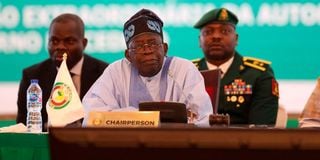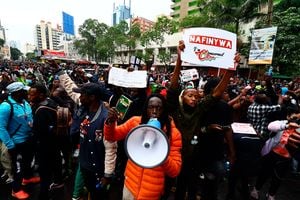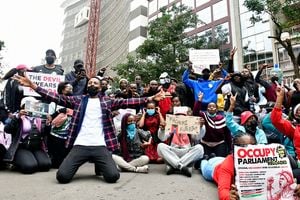
President Bola Ahmed Tinubu of Nigeria.
Nigeria may be Africa’s most populous nation with some 200 million people, according to official estimates.
However, it is the youth aged 30 or below that are keeping its internet fire burning.
Yet there is always a debate on how far this group can tilt the country's political waves.
In 2020, Nigeria experienced nationwide protest, which were violent in many places.
The protesters were calling for disbandment of special police squad that had been accused of turning rogue.
Dubbed Endsars, widely written as #EndSARS on X, then known as Twitter, the protests started off as an online trending topic before they were decentralised in social movements and erupted in a series of mass protests against police brutality in Nigeria.
They had no known leader or organiser.
The movement called for the disbandment of the Special Anti-Robbery Squad (SARS), a notorious unit of the Nigerian Police known for its long record of abuse on Nigerian citizens.
These protests were later attributed to a Gen Z ‘revolution’ using the social media.
The protests actually originated from a Twitter campaign in 2017, using the same hashtag calling for the unit's disbandment.
By October 2020, the hashtag #EndSARS had accumulated over 28 million tweets.
Solidarity protests and demonstrations by Nigerians in the diaspora and sympathisers occurred in many major cities around the world.
Notably, the movement was predominantly led by young Nigerians and expanded to include demands for good governance and accountability, amidst unprecedented hardship in the country.
On 11 October 2020, the Nigerian Police Force announced the dissolution of the unit with immediate effect.
The move was widely perceived as a triumph for the demonstrators.
But then that victory was immediately dismissed. Nigeria had previously made similar promises.
The Nigerian police is accused of retaining the rogue squad.
Meanwhile, the Gen Zs moved on. Its strength is also its weakness: impatience in numbers.
With four in every 10 people in age group subscribed to one social media platform or the other, they have become a noisy crowd: raising complaints, holding online webinars on policy problems or just lamenting about a political failure in the country, especially on security issues.
Their critics, often government lieutenants, have often described this group as lacking intelligence, and being poor in analytics due to their sentiments borne out of religious and ethnic biases, even though they are highly visible in the social media as influencers.
Nigerian Gen Zs are popularly known as ‘Internet Children’ even though the group here is not piled into a specific age as some were born and finished school long before internet became a thing.
But the group is mostly agitated, engage in banter on music, film and other social issues but avoid politics or politicians.
Politicians have, as late as last year, been dismissing them as not too influential in a political environment punctuated by tribe, religious affiliation and party politics.
Dr Alebiosu Hakeem, a social media analyst, says Gen Z youths are losing relevance because they cheapen their arguments with naughtiness and avoid national issues.
"Even in the entertainment industry where they are supposed to excel, they have effectively divided along religious, ethnic and economic classes thus giving the ruling class the cleavage to undermine their presence in Nigeria,’’ the 44-year-old analyst said.
A recent study said 47 per cent of Nigeria’s Gen Z population says they would rather hang out with people online than in real life.
That is according to a study by New York-based Boss Beauties. Nigeria has about 100 million people aged under 19 with about 50 million adults aged below 35 owning a smartphone.
According to the research, it was determined that seven in 10 Nigerians between the ages of 16 and 25 support their school teaching them virtually and digitally, rather than physical class.
They are also most likely to be into cryptocurrency, in which 44 per cent of boys said they preferred explore web3 platform compared to 29 per cent of girls.
In contrast, 29 per cent of the Nigerian Gen Z girls population are most likely to engage in virtual communities and networking activities compared to just 16 percent of boys.
This suggests their ideal political quest would be to force government officials to enable more accessible use of technology. But they have a disdain for Nigerian politics.
Mr Alabi Alausa, a social critic in Lagos, said he does not envy Gen Z because most of them aren’t proud of Nigeria, and are enthusiasts of ‘Japa’ (a local reference to encouraging people to leave Nigeria for greener pastors).
The government of President Bola Ahmed Tinubu, has since May 2023 changed some policies, by his predecessor Muhammadu Buhari following public pressure. Critics argue it didn’t result from online picketing though.
President Tinubu, a former Governor of Lagos State, is more towards the liberal economic side, while Buhari, a former military leader, is more protectionist.
For eight years, Mr Tinubu was quiet on the policies of the government and only spoke up when a policy appeared to be targeted at him during the election.
During the election, Mr Tinubu openly disagreed with the former administration on the implementation of the Naira redesigning policy and with his emergence he continued to strip some of the policies embarked on by former President Buhari.
Soon after taking power, he removed university dons from the central pay roll, IPPIS, in agreement with the demand of the lecturers which had continued to cause strikes in universities.
He also lifted the 8-year ban on 43 items restricted from accessing foreign exchange from the official local market.
Mr Danjuma Muhammadu, the Vice Chairman of the Independent Media and Policy Initiative (IMPI), a Think Tank said the changes weren’t influenced by protestations of the youth.
"Gen Z have not played any relevant role in governance in recent time. What we have discovered is stakeholders’ doggedness in overseeing and encouraging the government to fine-tune policies,’’ he said.







